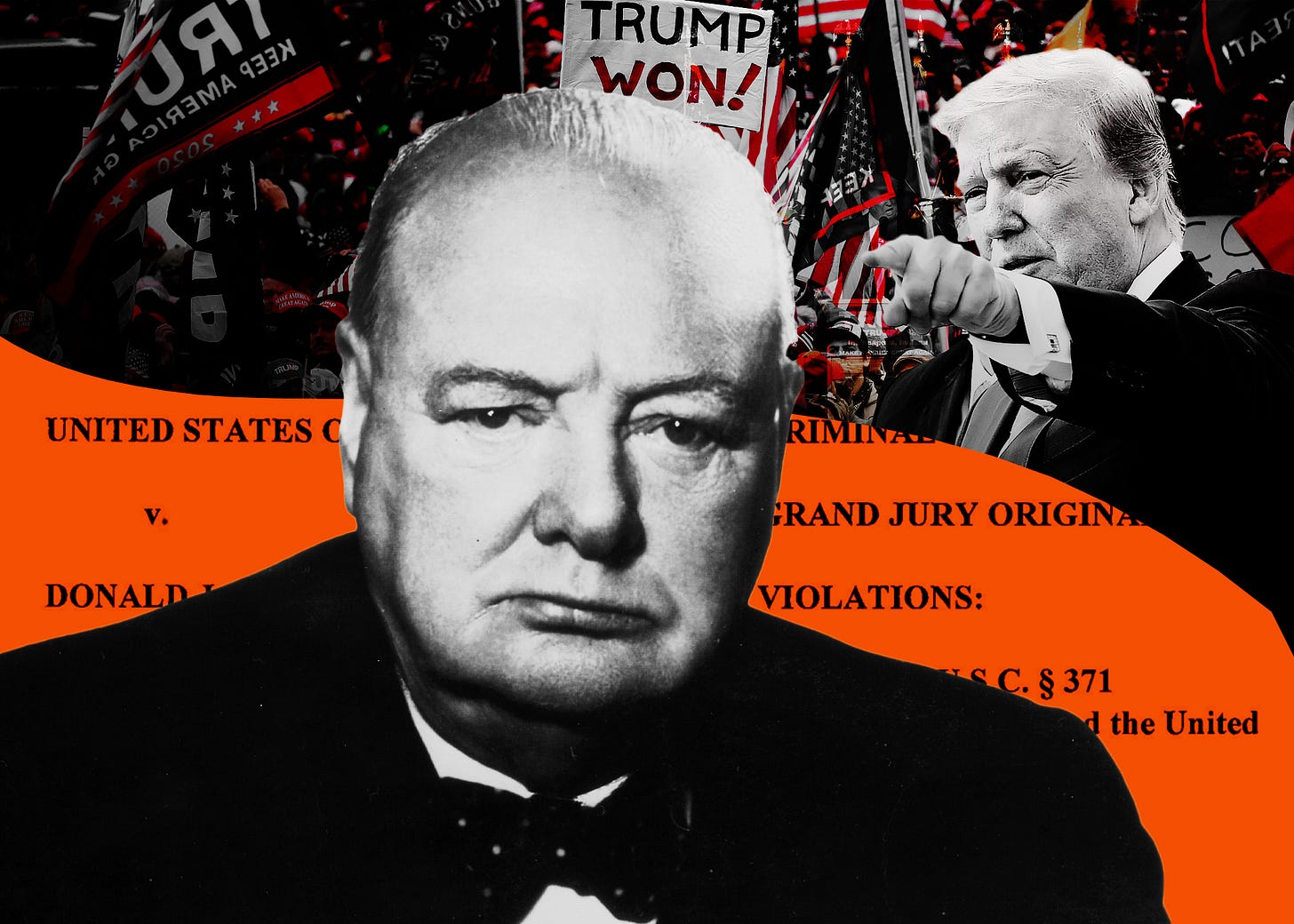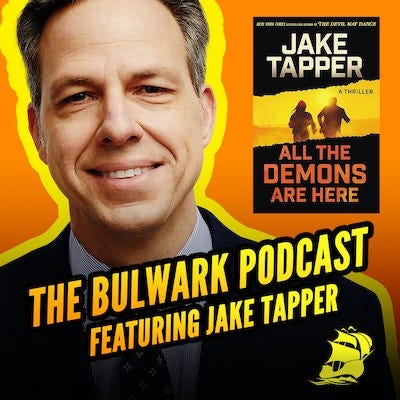TL;DR: JVL in yesterday’s Triad: Trump Pardon, Maybe. CJS in today’s Morning Shots: No f’ing way.
Happy Wednesday.
**
JVL makes what he describes as “The Keynesian Case for Pardoning Trump,” based on his reading of an intellectual biography of the legendary John Maynard Keynes. He draws an analogy between Keynes’s opposition to German reparations after WWI and the argument that Joe Biden should pardon Donald Trump.
It’s a rather long and circuitous road, so you should read the whole thing. It’s a good-faith argument. JVL offers some counterpoints to his own arguments and seems to hold the idea of pardoning Trump somewhat loosely, which is good because the historical analogy is tortured, and the pardon idea itself is, to paraphrase Caroline Lamb’s remark on Lord Byron, mad, bad, and dangerous.1
Keynes, it should be noted, was indeed prophetic when he said that the Carthaginian peace imposed on Germany by the victorious allies in the Treaty of Versailles was a formula for disaster. The victors demanded $120 billion in reparations, which as Keynes noted, was an utterly impossible sum. At most, a defeated Germany could afford to pay only $2 billion in compensation for launching the bloody war.
In The Economic Consequences of the Peace, published in December 1919, Keynes presciently warned: “If we aim at the impoverishment of Central Europe, vengeance, I dare say, will not limp. Nothing can then delay for very long the forces of Reaction and the despairing convulsions of Revolution, before which the horrors of the later German war will fade into nothing, and which will destroy, whoever is victor, the civilisation and the progress of our generation.”
He was obviously right.
**
Here we get to JVL’s argument. “Obligations and rules which are necessary in order for systems to function in ordinary times can become dangerous in times of crisis.” (I’d argue that those obligations and rules are sometimes even more crucial in a time of crisis, but let’s hold that thought for a moment.)
He writes:
Our financial system is merely a construct meant to help achieve a paramount goal: liberalism.
Similarly, “debt” is also a construct….
And the law? “Like debt,” he writes, “it’s a construct; a tool for fostering liberalism.”
Yet like the idea of “debt,” the rule of law itself is not the point. The point is preserving liberalism.
So, he asks: “What if the prosecutions of Donald Trump are analogous to reparations in the First World War?” He offers a Keynesian Case for pardoning Trump:
It might feel as though we are back to normal because the Trump administration is behind us, but we are still in a moment of crisis.
Authoritarianism has not been vanquished in American politics. If we hold Donald Trump strictly accountable for his debts to the rule of law, it will make him stronger and precipitate another moment in which he attempts to overthrow the liberal order. Our allies will be called to band together once again. And there is no guarantee that they’ll win the next confrontation.
In order to avoid such a future, President Biden should pardon Trump.
JVL admits that the analogy isn’t perfect. “I’m not convinced that pardoning Trump is the wise course. But I’m not convinced that it’s not, either.”
To put it mildly, I beg to differ.
**
Let’s start with the historical analogy. In 1919, Germany was not in the ascendant. It was prostrate. It had been defeated and (unlike Trump) it had admitted that it had lost. It had surrendered.
Keynes’s case for restraint was therefore an act of prudent mercy toward a defeated foe, not appeasement of a growing threat.
**
Let’s also address the argument that things like debts and the law are merely “constructs” in service of the actual end: liberalism.
If we are going down this road, we ought to admit that democracy is also a construct. The Constitution, and all the principles surrounding it are also “constructs.”
Rather than seeing this as an excuse to jettison these bulwarks of a liberal constitutional democracy, it should be a reminder that all of these so-called “constructs,” as well as other norms, are exceedingly fragile, and that we toss them out only at our peril.
The rule of law may indeed be a “construct,” but it seems naïve to believe that we can dispense with the “constructs” that uphold and undergird liberalism and still have anything like liberalism.
**
Which brings us to the proposed Trump pardon. JVL does not specify whether it would take place:
Before Trump is convicted? Or after conviction?
Before the election or after?
We also don’t know whether it would include all of the charges: his attempts to overturn the election; his conspiracy to remain in power; his obstructions; his racketeering. (Nota bene: a Biden pardon would only apply to federal crimes. State charges would be unaffected.)
But these questions seem important, don’t you think?
We also don’t know if any pardon would include any acknowledgment of guilt or responsibility by Trump. (Which seems unlikely.)
**
As we have seen, presidents have sweeping and nearly unlimited pardon powers. In an 1866 case (Ex Parte Garland), the Supreme Court stated that the power “extends to every offense known to the law, and may be exercised at any time after its commission, either before legal proceedings are taken or during their pendency, or after conviction and judgment.”
Even so, over time some norms have arisen regarding pardons, general guidelines used by the executive branch officials who advise presidents on pardons: Pardons can be granted if the individual is actually innocent or has shown signs of rehabilitation. Pardons are also “typically granted only after the convicted person has accepted responsibility for the crime and has demonstrated good conduct for a significant period of time after their conviction or completion of their sentence.”
In other words, pardons are supposed to include an acceptance of responsibility, remorse, and atonement.
None of this applies to Donald J. Trump.
**
When President Gerald Ford issued a pardon to former President Richard Nixon, he could reasonably assume that Nixon would go more or less quietly into exile. He was not the avatar of a mass movement that continues to lay siege to democratic institutions.
Trump on the other hand…
Does anyone seriously believe that a pardon would disarm Trump, or calm the base into rationality and respect for democratic norms? Does anyone (anyone? anyone?) think that he would — as Susan Collins so famously and wrongly claimed — “learn his lesson”?
Would a pardon put a stop to his firehose of demagoguery, invective, abuse, and attacks on the “deep state” and the criminal justice system? Does anyone seriously think that a pardon would lance the boil of revanchist Trumpism?
As my colleague Bill Kristol noted yesterday: “From the FBI in 2016 to Bill Barr in 2019, from the Biden DOJ in 2021 to Judge Cannon in 2023, from not enforcing campaign finance laws to not enforcing government ethics laws, the legal system has been too lenient or too considerate in its treatment of Trump, not too harsh.”
A pardon would be the ultimate leniency. He would undoubtedly claim EXONERATION!
**
We actually do know Trump’s attitude toward presidential pardons. As the NYT’s Peter Baker wrote at the end of Trump 1.0: “For Trump, Pardons as an Expression of Grievance.”
In the flurry of 49 pardons and commutations issued this week, he granted clemency to a host of convicted liars, crooked politicians and child-killing war criminals, but the through line was a president who considers himself a victim of law enforcement and was using his power to strike back.
Never mind that Mr. Trump presents himself as a champion of “law and order.” He has been at war with the criminal justice system, at least when it has come to himself and his friends. And so in these final days in office, he is using the one all-but-absolute power vested in the presidency to rewrite the reality of his tenure by trying to discredit investigations into him and his compatriots and even absolving others he seems to identify with because of his own encounters with the authorities.
**
A presidential pardon would confirm Trump’s point that all of the cases about him have been about politics, because the pardon suggests that that decisions about justice are made not in accordance with law, or by judges or juries, but by the personal fiat of the man/woman who holds presidential power.
In retrospect, Ford’s pardon of Richard Nixon created a dangerous precedent, because it suggested that presidents would not be held legally accountable for their crimes.
Pardoning Trump would put that very dangerous precedent on steroids, because it would confirm that presidents — or at least the most violently demagogic ones —are indeed above the law: immune from prosecution while in power and shielded from accountability on leaving office.
**
But would it be worth it anyway? Would a pardon bring an end to our “crisis”?
To answer that we first have to ask: What is the nature of our crisis? Trump himself is at the center of it and he poses a unique existential threat.
But our crisis is wider than Trump, isn’t it?
Tens of millions of Americans believe lies, and the incentive structure rewards the most dishonest and anti-democratic demagogues. There are millions of Americans, including activists, wannabes, politicians on the make, and elected officials, who are prepared to actively undermine both the rule of law and the democratic structures of our constitutional republic.
They do not disappear with Donald Trump. The crisis does not end with his pardon. On the contrary, an unaccountable Trump seems destined to be the lodestar of continuing assaults on the “constructs” of our liberal constitutional order.
That is the real crisis, not simply the attempts to hold Trump legally accountable.
So, giving Trump a Get Out of Jail Free card for attempting a coup, summoning a mob, and conspiring to throw out tens of millions of legitimate American votes, seems unlikely to be the mechanism to end the crisis of democracy we face in the 21st century.
**
JVL offers an historical analogy with WWI. I prefer this one from WWII.
“You were given the choice between war and dishonor,” Winston Churchill told Neville Chamberlain after he returned from Munich. “You chose dishonor and you will have war.”
All the Demons Are Here
On Tuesday’s podcast: The CNN anchor and author re-visits the 70s with a new thriller, featuring a Murdoch-esque character getting his toehold in American journalism, and Evel Knievel—a Trump precursor—reimagined as a presidential candidate. Plus, the media’s Trump coverage and Fox’s lucrative lies.
You can listen to the whole thing here.
Quick Hits
General Mark Hertling, in the Bulwark: What the Ukrainian Army Is Trying to Do Is Hard—Even for Americans
Mona Charen: Trump Supporters Are Responsible for Their Choices
Bill Lueders: Derrick Van Orden Makes No Apologies for Being a Jerk
Cathy Young: Why We Shouldn’t Validate the Politics of Grievance
Cheap Shots
The full quote is, of course, “mad, bad, and dangerous to know.”






“Keynes’s case for restraint was therefore an act of prudent mercy toward a defeated foe, not appeasement of a growing threat.”
This. You didn’t really have to continue to develop your argument when the truth of that sentence rang so forcefully.
This is an example of why I love the Bulwark - two intelligent analysts providing in-depth food for thought rather than shallow off-the-top-of the-head/shoot-from-the-hip "takes". This is a wonderful community!!